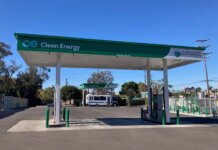NGVAmerica has pledged that by 2030, 80% of natural gas vehicle on-road motor fuel in the U.S. will be derived from renewable sources, rising to 100% by 2050.
Last year, RNG collected at local landfills, wastewater treatment plants, commercial food waste facilities and agricultural digesters displaced conventional natural gas derived from fossil sources as the dominant on-road NGV fuel source nationwide.
Moreover, the carbon intensity of RNG biofuel continues to drop. California fleets that fueled with bio-CNG in 2020 achieved carbon negativity for the year, with an annual average carbon intensity score of -5.845 gCO2e/MJ. Latest data puts the carbon intensity of bio-CNG in California’s system at -16.57 gCO2e/MJ (Q1, 2021).
NGVAmerica’s pledge meets the aggressive climate solution response sought by the United Nations’ Intergovernmental Panel on Climate Change (IPCC) in its recently released Sixth Assessment Report, Climate Change 2021: The Physical Science Basis which calls for new focus on “short-lived air pollutants” like recoverable methane emissions by capturing them at their source and repurposing them for good.
“NGVAmerica recognizes that climate change is real and immediate investment is needed to clean and decarbonize all transportation sectors,” says Dan Gage, NGVAmerica’s president. “The RNG motor fuel solution addresses two very real climate change concerns by capturing a waste liability, turning it into a green energy asset, and then using the resultant biofuel to displace diesel, cleaning up and decarbonizing those sectors that are the dirtiest and hardest to abate.”
By establishing an aggressive timeline to transition to 100% carbon-free natural gas biofuel in our nation’s refueling system, the natural gas in transportation industry offers the most affordable, scalable, and immediate solution to eliminate criteria pollutants that harm public health and drastically lower the carbon footprint of heavy-duty commercial fleets.
Investing in commercially available NGVs fueled by RNG is a cost-effective and immediate climate positive change policymakers can affect. The recently approved Senate Bipartisan Infrastructure Investment and Jobs Act of 2021 includes multiple opportunities to advance RNG motor fuel usage for clean school buses and ferries, transit buses, port operations, and heavy-duty freight hauling.
A copy of the complete statement is available here.







